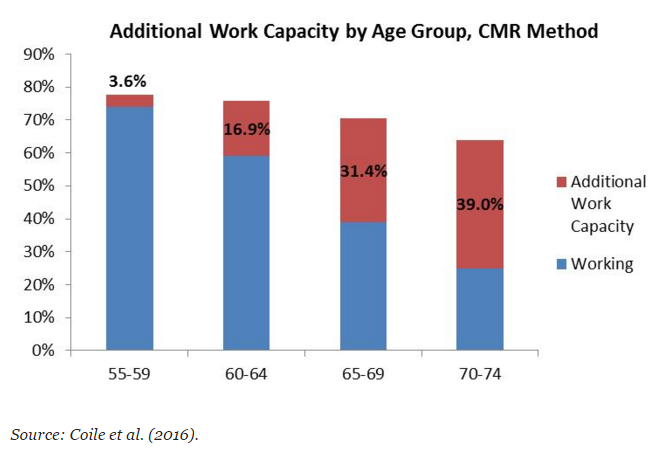In a political season more focused on borders and trade deals, entitlement reform hasn’t been high on anybody’s agenda this year. But that doesn’t mean there aren’t policy wonks out there trying to come up with ways to reduce the cost of Social Security, Medicare and the other elements of the social safety net that consume such a large portion of the federal budget.
One of the most frequently heard suggestions for reforming Social Security has been raising the retirement age. The argument is that with increasing life expectancy and a healthier population of older Americans, there is no good reason to stick to the somewhat arbitrary rule that 65 is the age at which someone should be allowed to retire.
Related: How to Simplify Your Retirement Accounts – and Make More Money
The libertarian Cato Institute recently flagged a paper published as part of the International Social Security Project by the National Bureau of Economic Research which tried to quantify just how much unused “work capacity” there is among retired Americans. Researchers determined that about 28 percent of Americans between the ages of 55 and 69 are healthy enough to be working but are not.
The real slackers, though, are people aged 70 to 74. The study found that 39 percent are still healthy enough to work but do not.
To be fair to the American worker, though, the report found that compared to most industrialized countries, people in the US tend to remain in the workforce longer – sometimes much longer.
Among men between 60 and 64, for example, the study found that in Germany fully 50 percent are capable of working but choose not to. In France the number is 63 percent. By comparison, only 17 percent of American men in that age cohort do not work even though they are capable of doing so.
Related: Why Your Retirement Calculator Could Be Your Downfall
In the next age cohort, age 65 to 69, there is no large European country where the number of able-bodied men who choose not to work is below 56 percent. It goes as high as 84 percent in Germany. In the U.S., only 31 percent of men between 65 and 69 fit choose not to work even though they could.
In fact, the only major industrialized country where workers stay employed later in life than Americans do is Japan.
At Cato, putting more retirees to work is seen as one possible element of a broader package of entitlement reforms that could avert a crisis for the retirement program in the future.
“Older Americans have seen significant gains in self-assessed health across all levels of education. While this is admittedly just one subjective metric, taken with the other findings of the paper, it suggest that older Americans have the capacity to work more than they do now,” wrote Cato research associate Charles Hughes.
“Due to welcome gains in life expectancy and other health improvements, older Americans can work more, and this should be considered when crafting reform proposals.”






